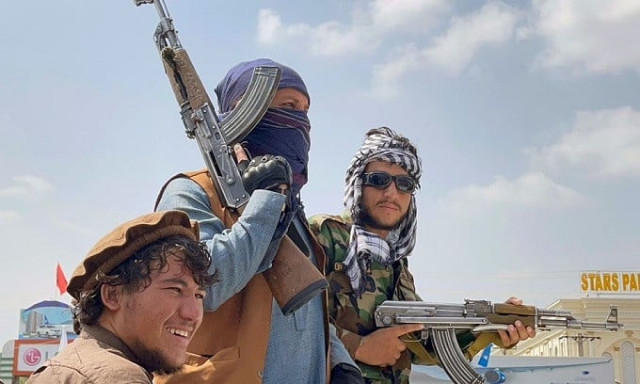The Taliban-appointed Afghan Ambassador to the UN, Muhammad Suhail Shaheen, gave an interview to Russia’s TASS earlier this week. Although the Kremlin still designates his movement as terrorists, it’s nevertheless cultivated extremely pragmatic ties with it in the shared interests of regional peace, security, and development. What stood out about this interview was Ambassador Shaheen’s eagerness to take his country’s ties with Russia even further, which speaks to how excellent their relations have recently become despite the diplomatic obstacle that was just touched upon. The relevant excerpt will now be republished in full, after which its significance will be analysed:
“Q: Several days ago, you claimed the Taliban is ready to represent Afghanistan in the UN. Do you expect Russia as a permanent UN member could support this initiative?
A: Yes, we do expect that. We had and currently have good relations with Russian Federation, and we are expecting them to support the new government that has been formed in the result of our struggle for liberation of Afghanistan. We also have support of the Afghan people, and hope to have friendly relations with Russia and other regional countries. Based on this, we expect Russia and other countries will support us at the Credentials Committee of the UN, because this is good for the peace in Afghanistan and in the region, which is also of interest to Russian Federation.
Q: Last week, three cargo planes delivered Russian humanitarian aid to Kabul. Is there any particular type of humanitarian aid Afghanistan needs now?
A: Certainly, we need medicines, because harsh winter is coming, and other humanitarian assistance, particularly from Russian Federation. We are expecting that. Similarly, we want Russian businessmen, investors and entrepreneurs to come to Afghanistan. We will welcome them and will provide necessary facilities. We have and will introduce investor-friendly laws in the country.
Q: Just for the Russian or any foreign businessmen?
A: For any foreign country. The law works for all. But we will appreciate and welcome if the Russians invest in Afghanistan.”
As can be seen, Ambassador Shaheen is thankful for Russia’s pragmatic relations with his country since the Taliban’s return to power in August. His high hopes of Russian political support for his movement’s formal recognition by the international community as Afghanistan’s de jure leaders are based upon this pragmatism practiced by Moscow. Russian Special Presidential Envoy to Afghanistan Zamir Kabulov recently elaborated on his country’s ties with the Taliban in an interview with Time Magazine, during which time he noted that more socio-political progress must first be made before the Taliban can receive their hoped-for delisting as terrorists and consequent international recognition.
Most crucially, Russia isn’t politicising its aid shipments to Afghanistan that are meant to avert its impending humanitarian crisis. This speaks to the sincerity of the Kremlin’s support for the Afghan people that it’s not letting its own terrorist designation of the Taliban stand in the way of helping average folks survive the ongoing famine and upcoming winter. This stance sharply contrasts with the US’, which has weaponised financial instruments to freeze Afghanistan’s funds within its jurisdiction. Washington wants to hold the Afghan people hostage in order to coerce unilateral socio-political concessions from the Taliban while Moscow is adamantly against putting innocent lives on the line in pursuit of that end. This pragmatism is certainly appreciated by Ambassador Shaheen.
The final element of his interview that’s worthy of commentary in this context is his expectation that Russian businessmen will invest more in Afghanistan. Their country will of course first have to formally recognise the Taliban as Afghanistan’s de jure rulers and remove its terrorist listing, but upon that happening, then it would be mutually beneficial for economic interests to play a leading role in taking Russian-Afghan ties even further. It’s here where larger geo-economic developments are relevant to mention in order to add credence to these lofty expectations. In particular, February’s agreement to build a Pakistan-Afghanistan-Uzbekistan (PAKAFUZ) railway can play a pivotal role in this respect.
Coincidentally, India’s ANI cited a report from Russia’s Sputnik the same week as this interview quoting a statement sent to the latter from the Pakistani Embassy in Moscow. According to them, a memorandum of understanding was reached between Islamabad and Russia’s Ural region amid the 7th meeting of the Pakistan-Russia Inter-Governmental Commission on Trade, Economic, Scientific and Technical Cooperation that was held in Russia from 24-26 November. The statement reportedly also said that “The current intergovernmental negotiations on building the New Trade Corridor through Pakistan-Central Asia-Russia is a clear sign of a new page in the strategic partnership between Russia and Pakistan.”
The “New Trade Corridor” (NTC) is evidently how Pakistan officially refers to PAKAFUZ, at least in its latest discussions with Russia. Whatever name one wants to call it, this trans-regional connectivity project is expected to serve as the lynchpin not only of Russian-Pakistani economic relations, but also Russian-Afghan ones too. It’s therefore recommended that a trilateral format be created between these three countries in order to optimize their related plans. Not only that, but this framework could also be expanded to include the Central Asian Republics (CAR) too, in which case it could become among Eurasia’s most important economic integration platforms.
To conclude, Russian-Afghan ties are promising but are presently held back from fulfilling their full potential due to Moscow’s continued designation of its partner’s de facto Taliban rulers as terrorists. Once this issue is finally resolved, the economic dimension of their ties can finally blossom if they agree to make the NTC/PAKAFUZ the core of their related efforts. Everything could be made all the more efficient if they create a trilateral format with the NTC/PAKAFUZ’s Pakistani anchor and consider expanding this platform to the CARs with time. Altogether, it’s becoming clear that the Taliban’s return to power in Afghanistan stands to greatly advance the cause of Eurasian integration.



COMMENTS
Comments are moderated and generally will be posted if they are on-topic and not abusive.
For more information, please see our Comments FAQ